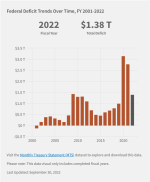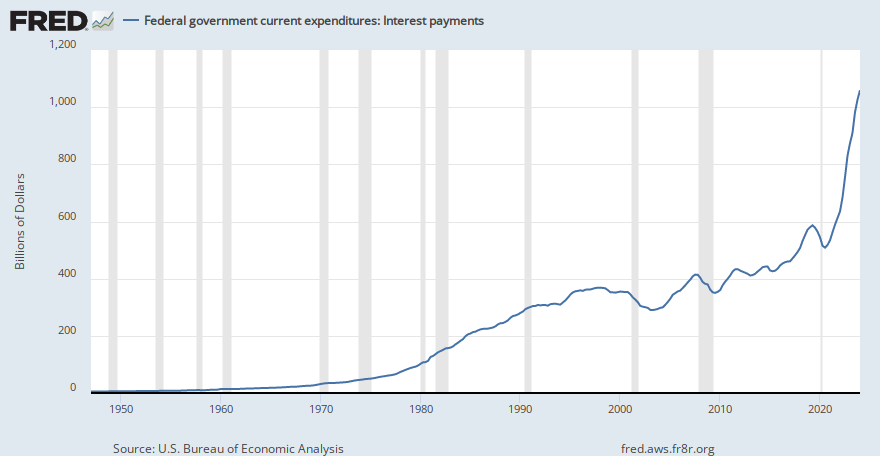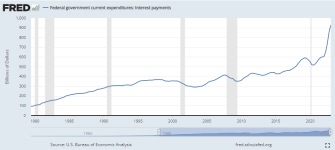- Messages
- 3,069
- Reaction score
- 3,350
- Points
- 248
The U.S. national debt has increased by $1 trillion in the five weeks since President Biden signed a bill into law that effectively turns off the debt ceiling until 2025.
According to Treasury Department data, the total national debt stood at $32.47 trillion on July 6, $1 trillion more than the $31.47 trillion level last seen on June 2. The national debt had been stuck at or near that June 2 level for months because the government had hit the debt ceiling and was legally prohibited from borrowing any more money.
On June 3, however, Biden signed legislation reflecting negotiations with House Republicans that requires a small spending cut next year and allows unlimited federal borrowing until 2025. With no debt ceiling in effect, federal borrowing jumped more than $350 billion in a single day and crossed the $32 trillion mark in less than two weeks.
The national debt has increased $4.7 trillion since Biden took office in January 2021, and is expected to keep rising in the face of annual budget shortfalls of at least $1 trillion per year. So far in fiscal year 2023, the government has spent $1.16 trillion more than it has collected and the Biden administration is predicting a $1.5 trillion budget deficit when the fiscal year ends in September.
Biden has continued to boast that he has shrunk the budget deficit.
"And by the way, parenthetically, I want you to hear about the deficit. I cut the deficit $1.7 trillion in two years," he said last week. "Nobody's ever done that – cut the debt $1.7 [trillion]."
But many mainstream news outlets have discounted that bragging point because the lower deficit mostly reflects the end of emergency spending related to COVID-19 and increased tax revenue that reflects the post-COVID economic recovery. When COVID hit in 2020, federal spending exploded by $2 trillion – the government spent a total of $6.5 trillion that year instead of the $4.4 trillion it spent a year earlier, and the budget deficit exceeded $3 trillion.

 www.foxnews.com
www.foxnews.com
According to Treasury Department data, the total national debt stood at $32.47 trillion on July 6, $1 trillion more than the $31.47 trillion level last seen on June 2. The national debt had been stuck at or near that June 2 level for months because the government had hit the debt ceiling and was legally prohibited from borrowing any more money.
On June 3, however, Biden signed legislation reflecting negotiations with House Republicans that requires a small spending cut next year and allows unlimited federal borrowing until 2025. With no debt ceiling in effect, federal borrowing jumped more than $350 billion in a single day and crossed the $32 trillion mark in less than two weeks.
The national debt has increased $4.7 trillion since Biden took office in January 2021, and is expected to keep rising in the face of annual budget shortfalls of at least $1 trillion per year. So far in fiscal year 2023, the government has spent $1.16 trillion more than it has collected and the Biden administration is predicting a $1.5 trillion budget deficit when the fiscal year ends in September.
Biden has continued to boast that he has shrunk the budget deficit.
"And by the way, parenthetically, I want you to hear about the deficit. I cut the deficit $1.7 trillion in two years," he said last week. "Nobody's ever done that – cut the debt $1.7 [trillion]."
But many mainstream news outlets have discounted that bragging point because the lower deficit mostly reflects the end of emergency spending related to COVID-19 and increased tax revenue that reflects the post-COVID economic recovery. When COVID hit in 2020, federal spending exploded by $2 trillion – the government spent a total of $6.5 trillion that year instead of the $4.4 trillion it spent a year earlier, and the budget deficit exceeded $3 trillion.

Federal debt explodes by $1 trillion in five weeks since deal suspending limit became law
The US national debt has jumped $1 trillion in the five weeks since President Biden signed a bill into law that suspends the debt ceiling and allows unlimited borrowing.





